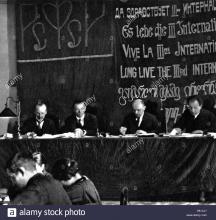The Third International was born from the ruins of the Second, in direct opposition to the imperialist war and in response to the victory of the proletarian revolution in Russia.
With the victory of the Stalinist counter-revolution in the USSR, the Third International degenerated to the point where it became nothing more than an instrument of the USSR's imperialist foreign policy.
Notes for a history of the workers' movement in Japan, part iii
Submitted by International Review on






